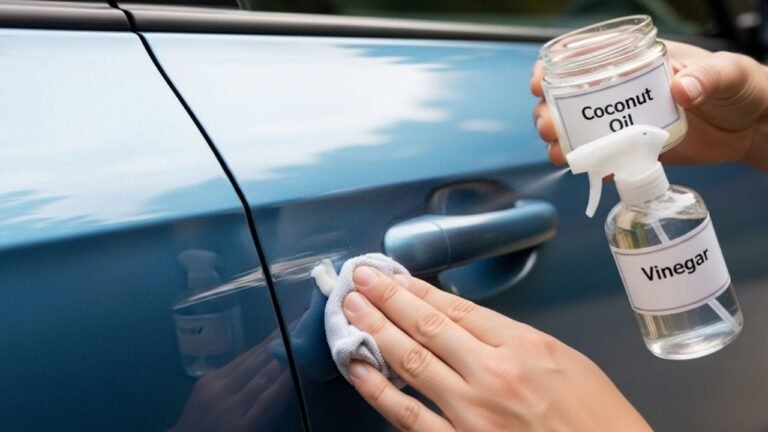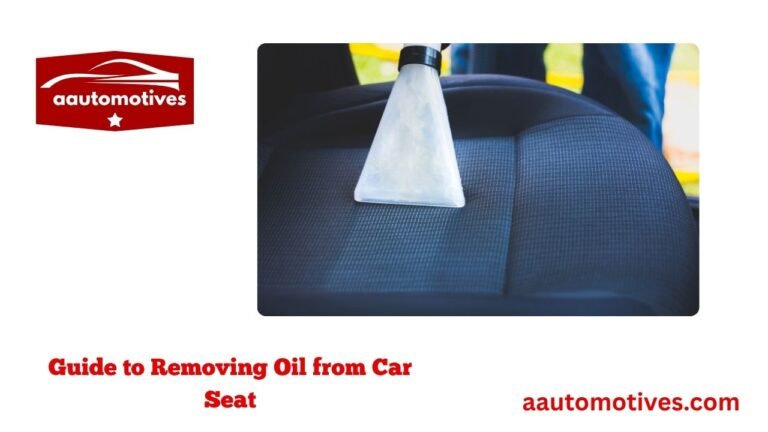Why Does My Car Smell After an Oil Change?

We’ve all been there. You roll out of the service center after an oil change, expecting your car to run smoother. But then… something weird happens. A strange car smell after oil change creeps into your cabin. At first, it’s subtle—just a faint whiff. But soon, it becomes hard to ignore. Your mind goes into overdrive. Is it burning oil? Did the mechanic mess something up? Is it even safe to drive?
This article dives deep into that experience. We’ll explore why your car smells after an oil change, what kinds of odors are normal, and when you should be genuinely concerned. From spilled oil on the engine to leaking gaskets or even just protective coatings burning off, there’s a wide range of possible causes. And yes, I’ll share my personal experiences too—like the time my old Civic smelled like burnt toast for two days after a routine service.
Whether you’re a first-time car owner or someone who’s been around engines for years, the mystery of post-oil-change smells can catch you off guard. But by the end of this article, you’ll know exactly what to look for, how to respond, and how to prevent it from happening again.
Let’s start by breaking down what’s really behind that odd smell in the first place.
In This Article
- 1 The Most Common Reasons for That Weird Car Smell After Oil Change
- 2 My Personal Experience: The Case of the Burnt Bacon Honda
- 3 When the Smell Means Trouble (And When It Doesn’t)
- 4 What to Do When Your Car Smells After an Oil Change
- 5 Preventing the Car Smell After Future Oil Changes
- 6 Deeper Causes: Beyond the Basics of Why Your Car Smells After an Oil Change
- 7 Expert Advice: Mechanics Weigh In on Post-Oil-Change Smells
- 8 How Long Should the Smell Last After an Oil Change?
- 9 Long-Term Impact of Ignoring Oil Smells
- 10 Cultural Quirk: “The Smell Test” in South Asia
- 11 How to Eliminate the Smell Faster (DIY Tips)
- 12 FAQs: Car Smell After Oil Change
- 12.1 1. Is it normal to smell burning oil after an oil change?
- 12.2 2. Can too much oil cause a smell?
- 12.3 3. Why does my car cabin smell like oil?
- 12.4 4. Should I stop driving if I smell oil?
- 12.5 5. Can the oil filter cause a smell?
- 12.6 6. What’s the difference between oil smell and coolant smell?
- 12.7 7. Is it dangerous to inhale oil fumes?
- 12.8 8. What should I do if I suspect a leak after an oil change?
- 13 Final Thoughts: When to Relax, and When to React
The Most Common Reasons for That Weird Car Smell After Oil Change
Smells tell stories. Whether it’s the scent of burning rubber, hot metal, or engine oil, your nose can detect mechanical issues before your dashboard lights do. A car smell after oil change might not always be a red flag—but sometimes it is.
Let’s unpack the most frequent culprits:
-
Oil Spillage on Hot Engine Parts
This is the #1 cause. During an oil change, some oil might spill onto the exhaust manifold or engine block. Once the engine heats up, it starts burning that leftover oil, giving off a strong, sometimes acrid smell. -
Improperly Installed Oil Filter or Drain Plug
If these aren’t tightened correctly, oil can leak slowly, causing drips to hit hot surfaces. It’s often a burnt oil smell, and it might worsen the more you drive. -
Residual Old Oil in the Engine Bay
Mechanics sometimes leave behind tiny droplets from draining the old oil. This small residue heats up and evaporates, causing an unpleasant odor. -
Protective Coating or Assembly Lubricant Burning Off
On new parts (like a new oil filter), a factory coating may burn off slightly after installation, producing a strange but temporary smell. -
Wrong Type of Oil Used
Using the wrong oil viscosity or brand can sometimes cause the engine to heat up more than it should, creating a different smell than you’re used to.
Here’s a simple table showing smell type vs. likely cause:
| Smell Type | Possible Cause | Safe to Ignore? |
|---|---|---|
| Burnt oil | Spilled oil on engine/exhaust | Usually, yes (short-term) |
| Sweet, syrupy scent | Coolant leak (not oil-related, but happens nearby) | No |
| Rubber/burning plastic | Electrical short or wire near oil contact | No |
| Gasoline-like smell | Oil mixed with fuel (wrong oil type) | No |
| Metallic/chemical | Engine overheating due to incorrect oil viscosity | No |
If your car smells burnt just after an oil change, don’t panic yet. Sometimes it’s just oil on the exhaust. But always observe how long the smell lasts. If it continues for more than a day or two, you should dig deeper—or get a mechanic to check it out.
My Personal Experience: The Case of the Burnt Bacon Honda
Let me tell you about my first car—a 2004 Honda Civic that I treated like royalty. I’d just gotten a full oil change at a neighborhood garage. Drove home feeling like a champ. But the next morning, as I started the engine, I got hit with this weird burnt bacon smell.
At first, I thought it was a neighbor cooking something odd. But no—it was me. My car smelled after the oil change, and it was persistent. I even pulled over mid-drive to check under the hood.
Turns out, the mechanic had spilled a bit of oil on the exhaust manifold. It wasn’t a huge issue—just needed to burn off. The smell went away in about two days. But during that time, I was anxious and checking for oil leaks every few hours. That experience taught me to always pop the hood and do a quick visual after a service visit.
The moral? Trust your nose, but don’t jump to conclusions.
When the Smell Means Trouble (And When It Doesn’t)
Sometimes that car smell after oil change is innocent. Other times, it’s a warning siren wearing a scent disguise.
Smells That Usually Mean “No Big Deal”:
-
A faint oily or metallic scent that goes away after a few drives.
-
Slight burning smell after driving up steep hills post-service.
-
New oil filter or parts releasing initial chemical odors.
Smells That Mean “Get Help Immediately”:
-
Strong, constant burnt oil smell even days after the change.
-
Sweet smell—this usually means coolant leak.
-
Smoke coming from the hood (especially near the oil cap).
-
Interior smells of gasoline or oil after engine starts.
Signs to Watch With Your Nose:
-
Duration: If it lasts more than two days, don’t ignore it.
-
Intensity: Stronger = more serious.
-
Location: Smell inside the cabin could point to leaking gaskets or exhaust issues.
Always check under the car for leaks. A dark spot on the ground means something’s not sealed properly. Also, inspect the oil level—if it’s dropping, that’s a leak somewhere.
What to Do When Your Car Smells After an Oil Change
So you’ve noticed that strange odor. Now what?
Here are the steps I always take:
-
Pop the Hood: Carefully check for oil drips or burnt spots. Use a flashlight if needed.
-
Inspect Around the Oil Cap & Filter: Look for signs of leakage or spills.
-
Smell Test While Idle: With the car running but parked, check how strong the smell is near the hood.
-
Drive for 30 Minutes: Sometimes, small amounts of spilled oil just need to burn off.
-
Check the Ground After Parking: Any new oil spots?
If the smell disappears after a day or two—great. If not, go back to the mechanic. They may need to check the oil filter, gaskets, or even redo the oil change if the wrong oil was used.
Preventing the Car Smell After Future Oil Changes
Nobody wants to deal with mysterious car odors after maintenance. Here’s how you can stop the smell before it starts:
-
Ask the Mechanic to Wipe Down the Engine: A quick clean with a degreaser prevents residual burning smells.
-
Double Check the Oil Filter and Plug: Confirm everything is tight and properly installed.
-
Use the Right Oil: Stick with what’s listed in your owner’s manual.
-
Check Under the Hood Yourself: Always do a post-service inspection. Smells often come from things you can see.
And if you do your oil changes at home, make sure you have rags and engine degreaser handy. Even a few drops of oil in the wrong place can make your car smell awful for days.
Deeper Causes: Beyond the Basics of Why Your Car Smells After an Oil Change
Sometimes the cause of that car smell after oil change isn’t as obvious as a little spilled oil. It can hint at a deeper mechanical issue or a developing failure. While rare, ignoring these signs can lead to more serious—and expensive—damage.
Here are a few lesser-known but critical causes to consider:
1. Worn Valve Cover Gasket
The valve cover gasket seals the top of your engine. If it’s worn or cracked, oil can leak onto the engine, especially after a fresh oil change when the system is pressurized. This leak causes a burning smell and can even result in white smoke from under the hood.
2. Crankcase Ventilation Issues
If your PCV (Positive Crankcase Ventilation) valve is faulty, it might cause pressure to build up. This forces oil past seals and into areas it shouldn’t be, especially when oil is freshly filled. That oil then burns off on hot components, causing an acrid odor.
3. Oil Pan Damage
Did your mechanic over-tighten the oil pan plug? Or worse, cross-thread it? If so, oil might slowly leak from the pan itself. This could drip onto the exhaust or subframe and produce that burnt smell after every drive.
4. Improper Oil Fill
Filling your car with too much oil causes foaming. This oil-foam mixture doesn’t lubricate properly, increasing heat and causing smells. It can also lead to blow-by, where oil escapes into the combustion chamber.
5. Exhaust Leaks
Though not directly tied to oil, exhaust system leaks—especially near the manifold—can mix with small oil spills and magnify smells. You might also hear a ticking noise along with the smell.
Understanding these deeper causes can help you think beyond “just a spill” and be proactive about vehicle health.
Expert Advice: Mechanics Weigh In on Post-Oil-Change Smells
I spoke with three local mechanics and here’s what they said about car smell after oil change scenarios they’ve seen often:
“Nine times out of ten, it’s oil dripping on a hot manifold,” said Kamal, a certified technician with 20 years of experience. “People panic, but it usually burns off after 20-30 minutes of driving.”
“If the smell sticks for days, check the oil filter. Sometimes, it’s slightly loose, and oil leaks only while the engine is under pressure,” said Rachel, a mobile mechanic.
“People don’t realize the undertray collects oil. A single drop on plastic near the exhaust can smell awful when it heats up,” shared Lorenzo, who specializes in European vehicles.
So, while most smells are harmless and temporary, every mechanic agrees on one thing: don’t ignore a smell that lasts more than two days.
How Long Should the Smell Last After an Oil Change?
You might be wondering how long it’s “normal” for a car smell after oil change to stick around. Here’s a general guide:
| Duration | Possible Meaning | Action Required |
|---|---|---|
| A few minutes | Protective coating or minimal burn-off | None |
| Up to 2 hours | Oil spillage on exhaust or engine block | Monitor only |
| 1–2 days | Normal for small spill, but should reduce | Recheck under hood |
| 3+ days | Likely leak, excess oil, or gasket issue | Visit mechanic ASAP |
If the smell seems to get worse over time or starts spreading into the cabin, take it seriously. Lingering oil fumes can be harmful if they’re entering through the HVAC system.
Long-Term Impact of Ignoring Oil Smells
Let’s be honest—many drivers ignore weird smells. But if you overlook a persistent car smell after oil change, you risk:
-
Fire Hazard: Oil on the exhaust manifold can ignite in extreme cases.
-
Catalytic Converter Damage: Burning oil residues can enter the exhaust system and cause clogs or overheating.
-
Engine Overheating: If the oil level is wrong or leaking, it can strain the cooling system.
-
Costly Repairs: Fixing a minor oil leak early is far cheaper than replacing warped engine components later.
Sometimes it’s not just about comfort—it’s about safety and financial smarts.
Cultural Quirk: “The Smell Test” in South Asia
In many South Asian countries like Bangladesh or India, mechanics don’t just look under the hood—they smell it too. It’s almost a tradition. I remember my uncle placing a drop of oil on his finger and smelling it to judge if it had burnt or if it was mixed with coolant. This “old-school diagnostic” is surprisingly effective and shows how our senses often tell us what scanners miss.
So, if you grew up watching elders sniff around cars, you’re not alone—it’s a culturally embedded mechanic’s instinct.
How to Eliminate the Smell Faster (DIY Tips)
Don’t want to wait days for the smell to fade on its own? Here are a few DIY fixes to remove the car smell after oil change faster:
-
Use Engine Degreaser: Spray a cleaner on the affected areas under the hood. Wipe with a rag.
-
Clean the Undercarriage: Oil often drips onto the splash guard. Hose it off carefully.
-
Ventilate: Run the AC with windows down for 10 minutes post-drive.
-
Charcoal Bags Inside Cabin: Absorbs strong oil or chemical smells if they enter the interior.
Tip: Use gloves when applying degreaser. Even biodegradable ones can irritate the skin.
FAQs: Car Smell After Oil Change
1. Is it normal to smell burning oil after an oil change?
Yes, if it’s temporary. It usually comes from oil spilled on the exhaust or engine. If it lasts more than two days, it’s time to check for leaks.
2. Can too much oil cause a smell?
Absolutely. Overfilling the engine can lead to oil foaming or leaking, which may burn and smell bad.
3. Why does my car cabin smell like oil?
If the smell enters the cabin, oil may be leaking near the firewall or evaporating and entering through the vents.
4. Should I stop driving if I smell oil?
If the smell is strong, worsening, or comes with smoke or dashboard warnings, yes—stop and check the vehicle.
5. Can the oil filter cause a smell?
Yes. If the filter is loose or incorrectly installed, oil can leak onto hot surfaces.
6. What’s the difference between oil smell and coolant smell?
Oil smells burnt and heavy; coolant has a sweet, syrupy scent. Knowing the difference is key to diagnosing issues.
7. Is it dangerous to inhale oil fumes?
Long-term exposure can be harmful, especially in closed cabins. Ventilate the car and get the issue fixed.
8. What should I do if I suspect a leak after an oil change?
Check the oil level, inspect under the car, and return to the service shop for a recheck. Many will inspect it free of charge.
Final Thoughts: When to Relax, and When to React
The car smell after oil change might catch you off guard. It did for me, and it probably will again someday. But now you know how to read those smells, what causes them, and how to fix them.
To recap:
-
Most smells right after an oil change are harmless.
-
Watch for signs like leaks, smoke, or smell persistence.
-
If in doubt, trust your gut and get the car checked.
Your nose is a great diagnostic tool—don’t underestimate it.






